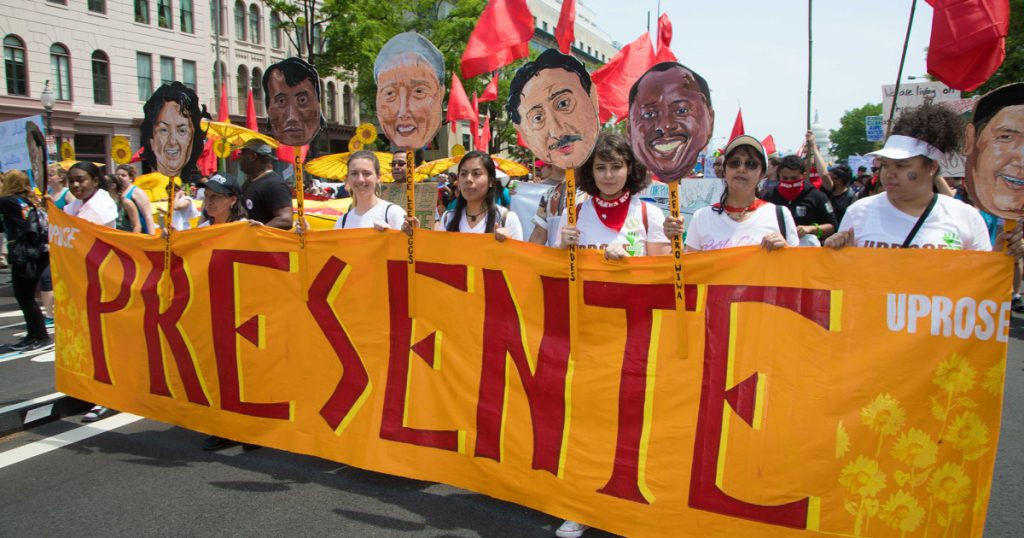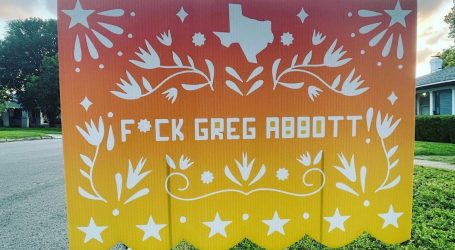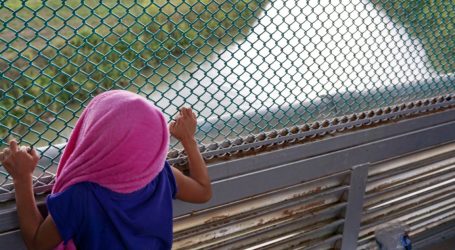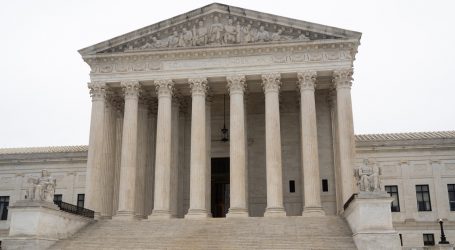Latinos Are Super Green. When Will Environmental Groups Realize?
Jeff Malet/Newscom/Zuma Press
This story was originally published by Grist and appears here as part of the Climate Desk collaboration.
Adelina walked briskly everywhere—and never more so than on her daily errands to the open-air mercado near my aunt’s house in Mexico City. My 8-year-old self would try to keep up, braids flying, as I watched our housekeeper’s shopping bags swing on her sturdy shoulders in a kaleidoscope of bright hues. Earlier this year, when a plastic bag ban took effect in Mexico City, news outlets noted a comeback of the traditional reusable bags Adelina once carried, which are made of plastic fiber or ixtle fiber from the maguey plant.
But bags like Adelina’s have always been popular in Mexico’s traditional mercados. Some of my favorite childhood memories are of those daily visits to the market during family stays in my parents’ native Mexico City. We’d pile those bolsas de mercado with everything from chiles, squash, and tomatoes to freshly-plucked chickens, which dangled from hooks above the food stall counters. Then we’d head to the tortillería to pile our bags with stacks of hot, freshly-made corn tortillas.
As a California-born kid who grew up in the 1980s when plastic bags were growing ever more ubiquitous, these bolsas de mercado left an impression. Being green was as easy as walking to the market. Doing it with flair in big, bold colors a la Mexicana made it fun. Today, the bags may be enjoying a comeback, but the fact that this custom survived the onslaught of throwaway plastic bags is also a powerful symbol of a cross-border culture that’s rooted in conservation. Latinos don’t get much credit for being environmentalists, but green organizations in the U.S. would be wise to tap this community as a natural constituency.
Mexicans, like other Latin American cultures, have a rich, indigenous heritage as natural caretakers of the environment. The Aztecs were essentially a zero-waste society, growing food on floating artificial islands known as chinampas on the lakes in the valley of Mexico, where the capital is now located. Today in the U.S., Latinos conserve not only out of economic prudence, but also because so many low-income Latino households live in frontline communities where they cope firsthand with the effects of pollution and contamination.
“In the United States too often we think that ‘environmentalist’ means the person who is driving in that electric vehicle, when in fact we neglect the 20 people who are riding in the bus,” California Attorney General Xavier Becerra—the first Latino to hold his position—said during a speech at the 2018 Global Climate Action Summit in San Francisco. “Hard-working people around the globe, people of modest means like my parents, are some of the best conservationists in the world because they can’t afford not to be.”
“In the United States too often we think that ‘environmentalist’ means the person who is driving in that electric vehicle, when in fact we neglect the 20 people who are riding in the bus.”
Becerra grew up in a working-class Sacramento household where his parents, Mexican immigrants, taught him frugality as a way of life.“Hard-working people are the ones telling their kids, ‘Apaga la luz! Turn off that light when you leave that room!’” Becerra continued at the summit. “They’re the ones that say, ‘Clean up that plate. Don’t serve yourself more than you can eat. It’s too precious.’”
In an interview with Grist, Becerra recalled that many of the conservation lessons he learned during his childhood were driven by economic need. His family couldn’t afford to stay in hotels when they visited relatives in Guadalajara, so his parents invested in a camper shell for the family pick-up truck, which doubled as a place to sleep and eat for the family of six. Becerra learned to cook on a tiny portable stove, create as little garbage as possible, and identify yerba buena (mint) and té de limón (lemongrass) plants, which Mexicans use to cure stomach aches and other ailments. “At the end of the day, you find that out of necessity you become really good stewards of the land,” said Becerra.
This thriftiness of working-class families translates into energy-saving behavior: In the United States, low-income households generally use about one-fifth the energy of their wealthier counterparts, Becerra pointed out. And in California, where almost 40 percent of the population is Latino, the average carbon footprint is nearly 50 percent less than the average American’s. In Becerra’s view, California’s diverse working class represents “our best environmentalists.”
Yet despite having a smaller carbon footprint, these communities don’t enjoy the full benefits of their energy-saving practices—in part because they often live near industrial facilities, heavily-trafficked corridors, or contaminated Superfund sites. Latinos and African Americans across California disproportionately live in communities overburdened by pollution. More than 18 percent of the state’s Latinos and 17 percent of African Americans live in one of the top 10 percent most pollution-burdened communities, compared to less than 3 percent of white state residents.
Those disparities spurred Becerra to create a state bureau of environmental justice within the attorney general’s office almost two years ago. The bureau works to protect vulnerable communities from environmental ills through investigations, oversight, and the enforcement of existing environmental laws. Among other measures, it has supported an Oakland ordinance prohibiting the storage and handling of coal and petroleum coke at a rail and marine terminal in the city.
Even beyond the bureau, environmental work has been one of Becerra’s priorities as attorney general. Since 2017, his office has won 20 environmental lawsuits against the federal government. The California Department of Justice has challenged the Trump administration on a range of issues: It has opposed proposed offshore drilling on California’s coast and challenged the repeal of regulations governing hydraulic fracking of oil and gas wells drilled on federal and tribal lands.
Latinos typically don’t self-identify as environmentalists, but surveys show that they consider themselves to be stewards of the environment. Mark Magaña, president and CEO of the nonprofit GreenLatinos and a 2017 member of the Grist 50, has found that while most Latinos may not be active in green organizations, they are what he describes as “cultural environmentalists.” That is, in their day-to-day lives they tap into the cultural traditions of their ancestors—the ingrained conservation practices of their mothers, aunts, uncles, and grandparents.
“We learned environmentalism on the back of a chancla,” said Magaña, referring to the whack of the sandal some Latinos use to discipline their children. “You close the fridge. You eat all your food. You don’t waste. You don’t turn on the heat, you put on a sweater. You don’t turn on the AC, you put a wet rag around your neck. You share what you have. These were things that became second nature.”
When Magaña was growing up in Los Alamitos in California’s Orange County, his grandmother would give him birthday cards with a dollar bill attached with recycled Scotch tape, which she had carefully peeled off of discarded Christmas wrapping paper. Today, as he travels across the country, Magaña says that these everyday examples of conservation inspire “aha!” moments in other Latinos.
“I just try to emphasize that you’re part of this, you’re already there,” said Magaña. “You’re already a steward of the environment, a conservationist.”
In small and large ways, we’re protecting the earth with our cultural practices. They’re also common sense. Every grown Mexican son or daughter knows the drill: You do not leave your mom’s house until she’s packed you a mountain of leftovers culled from her fridge. And like a typical Mexican mom she loads up the food in handy to-go containers—in my mom’s case, giant plastic cottage cheese tubs or tiny yogurt cups that she has stacked away and will reuse for eternity.
Growing up in Anaheim, California Congresswoman Linda Sánchez remembers the many small ways that her family practiced conservation. Forgoing store-bought clothes, Sánchez’s mother would hand-sew outfits for her young children from a single piece of cloth. Sánchez and her siblings repurposed paper grocery bags as book covers and paper for homework assignments, and they reused mason jars as drinking glasses. The future congresswoman also learned to conserve every possible drop of water from the shower, placing a bucket under the faucet while she waited for the water to get hot. She then used the bucket to water her plants—a habit that came in handy during the drought California experienced this past decade.
These kinds of practices were also instilled in California Secretary of State Alex Padilla. Growing up in the Pacoima neighborhood of the San Fernando Valley, Padilla told Grist that recycling and reusing were integrated into his family’s life out of economic necessity. Padilla and his father, a short order cook originally from Puerto Vallarta, Mexico, would comb their neighborhood in the family truck to collect cans, cardboard, and newspapers to recycle and help the family make ends meet. His mother, a house cleaner, would receive clothing hand-me-downs from one family whose children were about the same age as Padilla and his siblings. His grandmother used reusable mesh shopping bags, and in Pacoima some of those same bags were ingeniously converted into portable grocery carts with wheels, recalled Padilla.
Recycling was a way of surviving, whether it was reusing newspapers to wrap and carry eggs home from the market, or converting store-bought Doña Maria mole sauce jars into drinking glasses—a practice Padilla said he recognizes instantly in other people’s homes.
“In many ways, it’s a question of economics, being as efficient with our resources as possible: natural resources, financial resources, and otherwise,” said Padilla.
Beyond the economic motivations, however, Padilla was also taught by his elders to treat the planet as a treasured resource. During family trips to the beach, as Padilla and his cousins would pack up their towels and belongings to head home, his uncle would remind the kids to pick up the trash around them. They’d protest, pointing out that it wasn’t their waste. “That doesn’t matter,” Padilla recalled his uncle telling them. “You always leave the place better than you found it.”
Padilla shared that anecdote while lobbying for votes during the campaign to ban plastic bags in California in 2016. “It’s a simple story, but it’s very profound and taught our generation to leave this earth better than we found it,” he said.
At the national level, Mark Magaña aims to transform GreenLatinos into an activist organization that works beyond the halls of Congress and partners with local Latino activists who can fight climate change in towns and cities across the country. “In order to overcome the climate crisis, it’s not going to be a straight-up legislative battle or a straight-up regulatory battle,” said Magaña. “It’s going to demand on-the-ground, day-and-night activism in order to convince the corporatists—Democrats and Republicans—that we have to change our economic system, that we have to change our consumption, that we have to change our equity and our justice system.”
In Puerto Rico, GreenLatinos worked with residents and activists in 2016 to convince the regional office of the Environmental Protection Agency to commit to closing down several toxic landfills that were not in compliance with local and federal groundwater regulations. More broadly, the organization is working to create chapters and hubs for this kind of work across the U.S.
As they do so, Magaña said that they are keeping in mind that Latinos approach their environmental stewardship with a mentality that prioritizes community and family. For example, GreenLatinos launched a clean air project with Moms Clean Air Force, a community of parents against air pollution, and named it Ecomadres—a play on the Spanish term comadres, which translates to something like “close friends” or “dear friends,” as well as madre, the Spanish word for “mother.” The term functions both as a nod to the women and mothers who are pillars in Latino communities, as well as the close kinship between comadres who depend on each other, work together, and unite to be a stronger force, said Magaña. Ultimately, for GreenLatinos this effort is about reminding Latinos who are joining the environmental movement that they are not alone. It’s about saying: “There are a lot of other people who are concerned about this who will fight with me, and we’ll do it in a way that our ancestors did it,” said Magaña.
History shows that Mexico’s ancient Aztec civilization was able to develop “a resource-efficient culture” with waste management practices that put everything to use, as author and global waste expert Martin Medina outlined in a 2014 essay. All organic waste—from food leftovers to agricultural residue to human excrement—fertilized the chinampas’ crops. The excrement, which was also used for tanning leather, was collected from a network of public latrines and sold at the city’s main market. The Aztec world was a law-and-order society with strict rules that prohibited waste dumping and littering during the reign of Moctezuma II in the early 1500s—even sentencing a person to death if they chopped down a tree without authorization. Medina writes that no records have been found of Aztec garbage dumps: “Instead they developed a system that is similar to a sustainable materials management system, considered today as the most desirable way to manage solid wastes, conserve resources and protect the environment.”
73 percent of California Latinos are in favor of legislators’ more ambitious goals to limit greenhouse gas emissions…48 percent of whites in the state say the same.While the Aztec’s systematic approach to waste disappeared after the Spanish conquest, today that eco-spirit is very much alive on both sides of the border. I’ve seen it in Tijuana, Baja California, where I reported on hillside shantytowns that recycle discarded American garage doors and use them to build homes, churches, and stores. I see it among California’s farm workers, who rise long before the sun to gather four or more coworkers in a carpool to the orchards and fields where they pick our fruits and vegetables. And I see it in the Adelinas of today, who head to market with their bolsas de mercado, doing their tiny part to protect the earth from more throwaway plastics.
The polls tell us that 73 percent of California Latinos are in favor of legislators’ more ambitious goals to limit greenhouse gas emissions. Seventy percent say that global warming is a very serious threat to our economy and quality of life. (62 percent of African Americans, 60 percent of Asian Americans, and 48 percent of whites in the state say the same.) Among U.S. Latinos, green organizations have a community of natural allies who are receptive to tackling climate change, plastic pollution, conservation issues and much more. In fact, they’ve got it in the bag.





